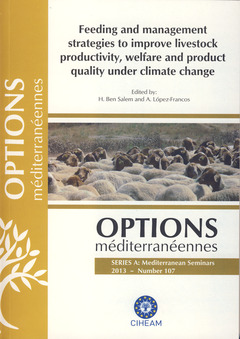Description
Feeding and management strategies to improve livestock productivity, welfare and product quality under climate change
Options méditerranéennes SERIES A : Mediterranean seminars Series, Vol. 107
Authors: BEN SALEM H., LOPEZ-FRANCOS A.
Language: English
Subject for Feeding and management strategies to improve livestock...:
Approximative price 45.73 €
In Print (Delivery period: 10 days).
Add to cart
Publication date: 06-2012
299 p. · 17x24 cm · Paperback ·
299 p. · 17x24 cm · Paperback ·
Description
/li>
Most of world’s rural population depend on livestock for their livelihood,
especially in the Mediterranean, African and many Asian countries. To
reduce poverty, fight hunger and ensure global food security, there is an
urgent need to increase livestock production in sustainable ways. However,
livestock production systems in those areas are constrained mainly by low
genetic potential, feed shortage, nutrient deficiency, inappropriate
husbandry, and zoonotic and other emerging infectious diseases. Climate
change is also expected to exacerbate the vulnerability of livestock
systems and to reinforce existing factors that simultaneously challenge
livestock production such as rapid population and economic growth,
increased demand for food and products, and increased conflicts over
scarce resources (e.g. land, water, and feed). Scientific advances in
animal nutrition and new strategies in livestock feeding may undoubtedly
contribute to this aim, as nutrition is one of the main factors driving
the functioning, efficacy, efficiency and evolution of livestock systems.
This volume presents 42 articles selected among the contributions to the
14th Seminar of the FAO-CIHEAM Sub-Network on Sheep and Goat Nutrition,
organised by The National Institute of Agricultural Research of Tunisia
(INRAT) and the Mediterranean Agronomic Institute of Zaragoza
(IAMZ-CIHEAM) in Hammamet (Tunisia) in June 2012. The Seminar provided the
opportunity to present and discuss scientific advances and approaches in
animal nutrition and feeding sciences, covering the topics of nutritional
efficiency, use of local feeding resources, rumen manipulation, animal
welfare, products quality, and proposing potential alternatives for coping
with climate change and mitigation its effects on the farming systems.
© 2024 LAVOISIER S.A.S.




